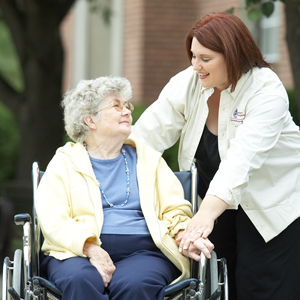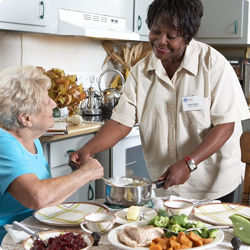Foodborne Illness: The Risk to Seniors and Prevention at Home
Blog | September 8, 2016
When certain disease-causing bacteria, viruses, or parasites contaminate food, they can cause foodborne illness ─ also known as food poisoning. In the U.S., salmonella, norovirus, campylobacter, E.coli, listeria, and clostridium perfringens are the most common foodborne illnesses.
The Risk to Seniors
As seniors age, it is normal for their bodies body to not work as well as when they were younger. Organs and body systems change, and are less able to combat bacteria. That is why seniors who contract a foodborne illness are more likely to have a lengthier illness, undergo hospitalization, or even lose their lives. Here are some key factors that could make older adults more susceptible to contracting a foodborne illness in the first place:
- There may be a decrease in stomach acid secretion, which is a natural defense against ingested bacteria.
- The stomach and intestinal tract may hold on to foods for a longer period of time.
- The liver and kidneys may not rid the body of toxins as readily.
- The sense of taste or smell can be affected by medication or illness, and may not always alert the senior when food is spoiled.
- The side effects of some medications for chronic illnesses ─ such as diabetes, arthritis, cancer, or
cardiovascular disease ─ or the chronic disease itself may weaken the immune system.
What are the Signs of Foodborne Illness?
The signs and symptoms of food poisoning range from upset stomach, diarrhea, fever, vomiting, abdominal cramps, and dehydration, to more severe illness or even death. Anyone experiencing symptoms of a foodborne illness should call a doctor immediately.
How to Avoid Contracting a Foodborne Illness at Home
Older adults must be vigilant when handling, preparing, and consuming foods, and there are ways to significantly reduce the risk of foodborne illness, especially in the home.
- Wash hands, utensils and food surfaces often.Wash hands with warm, soapy water before and after handling or preparing food. Use hot, soapy water to wash utensils, cutting boards, and
other surfaces that are used. - Keep raw foods separate from ready-to-eat foods. Keep raw meat, poultry, fish and shellfish away from other foods when shopping, preparing or storing foods to prevent cross-contamination.
- Cook foods at a safe temperature.Most harmful organisms are killed this way. Use a food thermometer, plus a food-specific temperature guide, often found in large cookbooks or online.
- Refrigerate or freeze perishable foods immediately. Do so within two hours of purchasing or preparation. Refrigerate foods within one hour if the room temperature is above 90 degrees F.
- Defrost food safely.Don’t thaw food at room temperature; defrost it in the refrigerator. If you microwave frozen food using the “defrost” or “50 percent power” setting, cook it immediately.
- If in doubt, throw it out.If you aren’t sure if a food has been prepared, served, or stored safely, discard it. Food left at room temperature too long may contain bacteria or toxins that can’t be destroyed by cooking. Even if it looks and smells fine, the food may not be safe to eat ─ so don’t taste it.
Foods to Avoid
Food poisoning is especially serious and potentially life-threatening for older adults and people with weakened immune systems. They should take extra precautions by avoiding the following foods:
- Raw or rare meat and poultry
- Raw or undercooked fish or shellfish, including oysters, clams, mussels and scallops
- Raw or undercooked eggs or foods that contain them, such as cookie dough and homemade ice cream
- Raw sprouts, such as alfalfa, bean, clover and radish sprouts
- Unpasteurized juices and ciders
- Unpasteurized milk and milk products
- Soft cheeses, such as feta, Brie, Camembert, blue-veined cheese, and unpasteurized cheese
- Refrigerated pates and meat spreads
- Uncooked hot dogs, luncheon meats, and deli meats
Fast Fact
A total of about 4 million (1 in 8) Canadians are affected by a food-borne illness. Of these, there are about: 11,600 hospitalizations and 238 deaths
Comfort Keepers® can help. Our caregivers help seniors and others to properly prepare foods for healthy meals – and even help with food shopping. Caregivers will also help with tasks around the home, provide companionship, and help keep seniors safe. Call us Today : 705-293-5553
References:
Mayo Clinic. Diseases and Conditions: Food Poisoning. Web 2014.
U.S. Department of Health and Human Services at Foodsafety.gov. Bacteria and Viruses. Web 2016.
U.S. Department of Agriculture. Food Safety and Inspection Service. “Older Adults and Food Safety”. Web. 2011.
U.S. Food and Drug Administration. “Food Safety for Older Adults”. Web. 2016.
Government of Canada. “Yearly food-borne illness estimates for Canada.” Web 2016.
Individualized Home Care Options
Long-Term Home Care, 24 Hour Home Care & Short Term Care Options Customized for You







